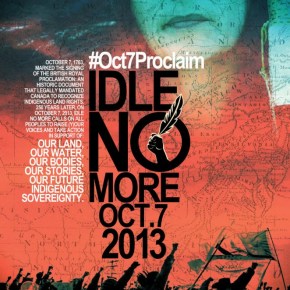People everywhere honour what has been inherited from the past.
In Canada, there is a heritage museum of some sort in most cities and small towns across this country. We celebrate everything from maple syrup and bighorn sheep to pioneers and voyageurs.
The federal government hosts War of 1812 re-enactments, elaborate Dominion day celebrations, and tells us that January 11th is an “important day” to honour Sir John A. MacDonald.
Some people keep tradition alive all year long, whether through planting heirloom seeds or weaving with looms.
And we have laws to protect the inheritance passed on from those who have gone before us. That is how wealth is maintained within families. It is why Queen Elizabeth II is the Head of State.
October 7, 2013, is also an important day. It is the 250th anniversary of the Royal Proclamation of 1763, wherein the British Crown recognized Indigenous sovereignty and land title through much of what is now Canada, leading some to call the document an Indigenous magna carta.
The significance of the Proclamation is realized in landmark Supreme Court decisions like Calder and Delgamuukw, and its relevance is affirmed in section 35 of Canada’s Constitution and section 25 of the Charter of Rights and Freedoms. It is the law that was supposed to protect the wealth of Indigenous families for future generations.
Some are doing their part to mark the day.
For example, the Assembly of First Nations will host a morning press conference and an event at the Museum of Civilization, where the Proclamation is on display, later in the day.
Idle No More activists have planned a global day of action (#Oct7Proclaim). There are currently 63 events listed on its website, from Hawaii to Sattal, India. If those events bring numbers comparable to the thousands who attended the truth and reconciliation march in Vancouver last month, the message will not be lost.
And Tom Mulcair, the Leader of Her Majesty’s Official Opposition, is hosting a commemorative event at Stornoway on the eve of the anniversary. As far as I can ascertain, this is the only way anyone in an official government capacity is acknowledging with Indigenous people our common interest in recognizing the meaning of the Proclamation and applying it.
By contrast, the Harper government, obsessed with history and heritage when it comes to hockey and war, is blowing this one off.
When mines and pipelines don’t get built, when more roads and railways are blocked, when yet another report of poverty on reserves is published and the Harper government tells us that it has done all it can to work with Indigenous peoples, remember this day.
It is not the disrespect, the small-mindedness and mean-spiritedness of those who could not spare a moment to commemorate one of the most important dates in the history of what has become Canada that is at issue here.
Nor is the obliviousness to history, law, and whatever reality doesn’t fit the Prime Minister’s ideology the essential problem.
It is the denial of our inheritance to all of us, Indigenous and non-Indigenous alike.
There is plenty of talk about Indigenous poverty, what can be done, and who to blame. And there is plenty of misdirection offered, some intentional, some well intentioned, to distract us from the obvious truth: if every generation is denied its inheritance, then each generation begins in poverty.
Fundamentally, the denial of this legal inheritance is why there is a 50% child poverty rate for status Indian children in Canada. It is why the social problems — out of whack with Canadian averages, but consistent when compared to other poor people — of substance abuse, incarceration and suicide remain stubbornly intractable. And this costs us all, more than most of us admit.
It is why the relationship between Indigenous peoples and the Canadian government is at such a low point, something that may one day soon cost us all more than we care to imagine.
As John Raultson Saul pointed out in his book, A Fair Country, this heritage underlies much of what Canadians value about our society, multiculturalism, peacekeeping, and socialized medicine, to name a few items. Yet still we deny it.
And as we look for ways to deal with the crisis that is coming due to climate change, honouring this heritage can help us remember what it means to belong to and be part of the land rather than arrogantly exploiting our supposed dominance over it.
It is the denial of this heritage that maintains the enormous gulf between peoples in Canada and puts at risk our future prosperity.
On October 7, it would help to remember that honouring this heritage — our heritage — just might lead to healing, reconciliation and a better future, for all our relations.



